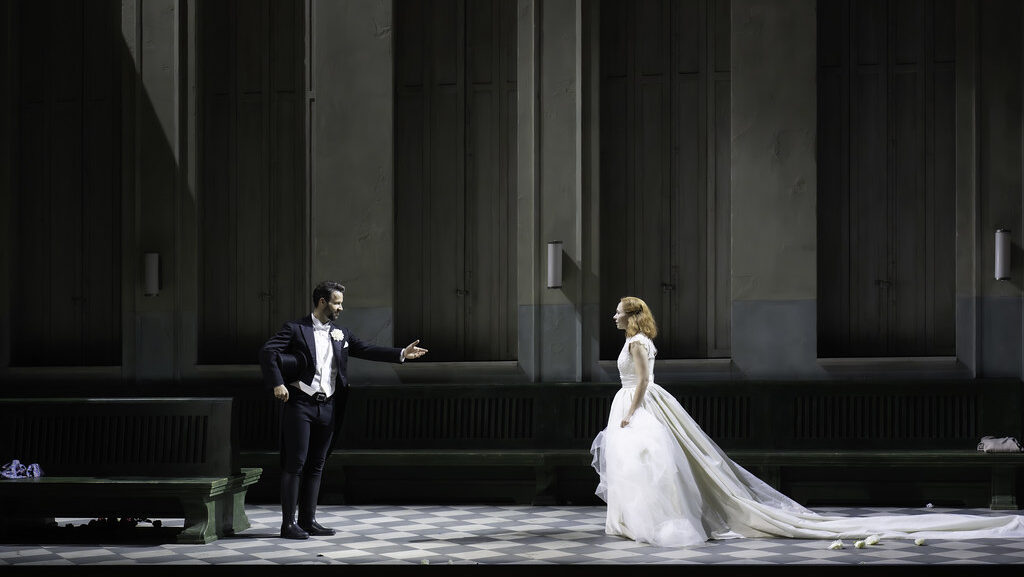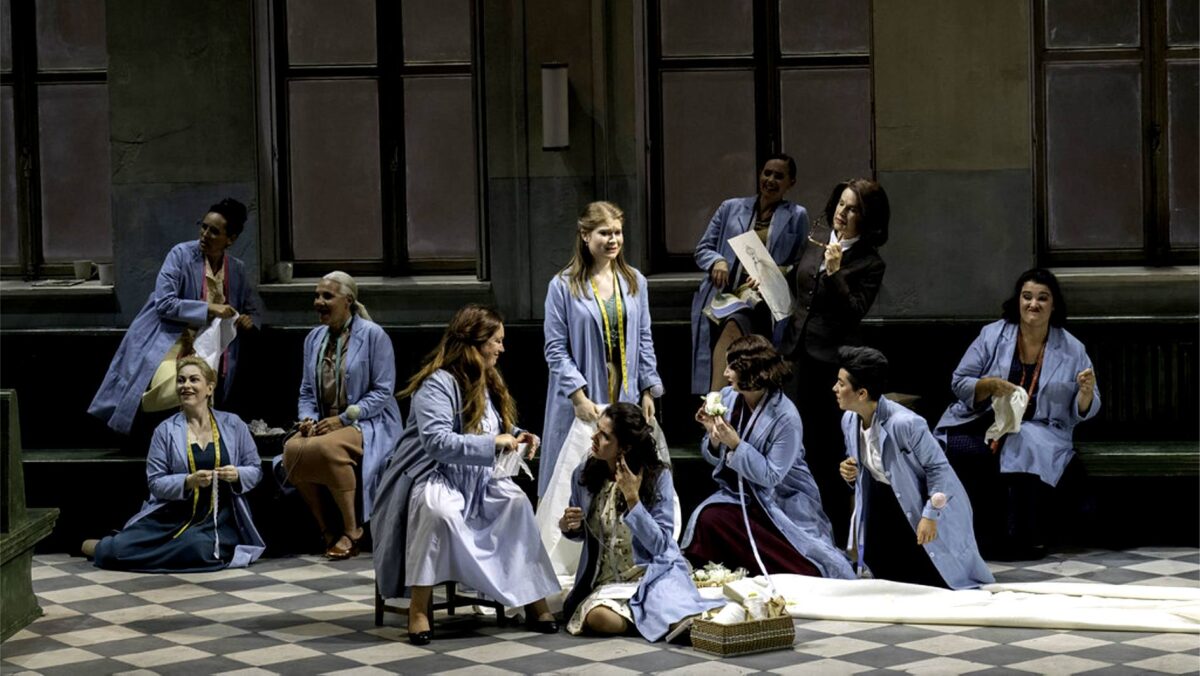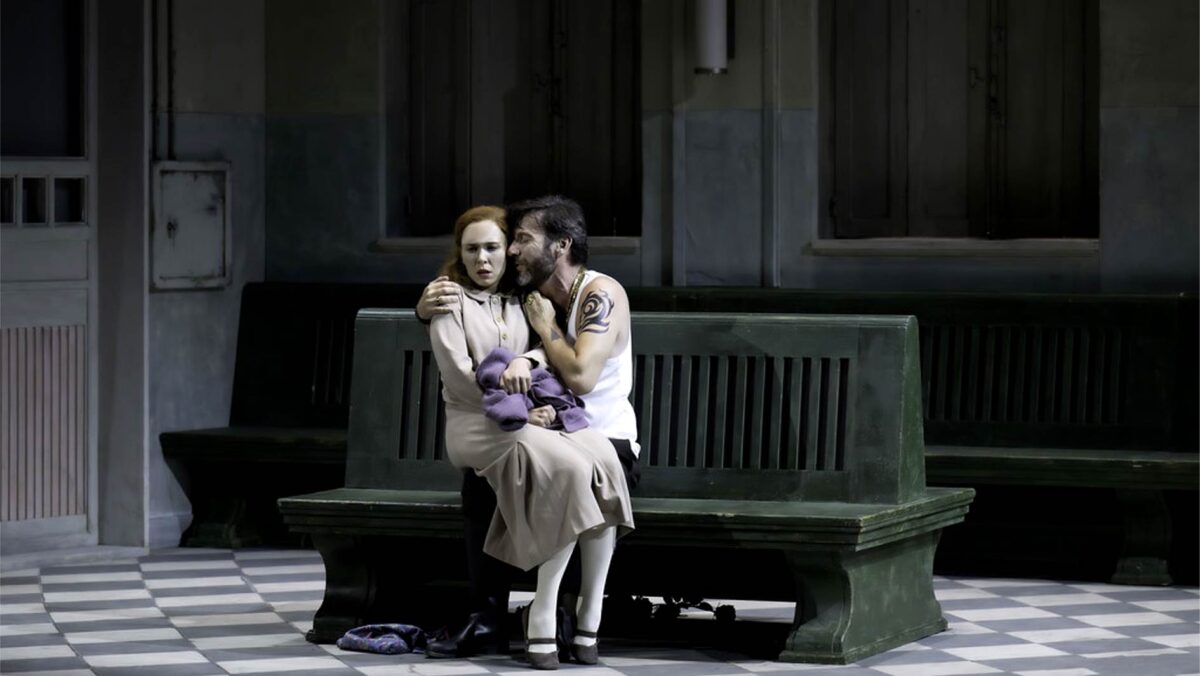

Monika Rittershaus
Final 12 months right now, expensive Parterre readers will recall, the curtain rose on Debussy’s Pelléas et Mélisande on the nice Aix-en-Provence Pageant to seek out Mélisande not misplaced in a forest however deserted in a resort room, the place she proceeded to manage a being pregnant take a look at. This 12 months, Gustave Charpentier’s Louise appeared neither, because the libretto signifies, in her dad and mom’ sweat store (Act I) nor within the festive streets of working-class Montmartre (Acts II and III), however within the cavernous ready room of a psychiatric hospital. Very like Katie Mitchell’s Pelléas, Christof Loy’s manufacturing of Louise (the second of his profession), exemplifies so-called director’s opera (or Regieoper), the essentially German argument that the staging of legacy repertoire requires an argument that justifies the existence and argument of the work itself in and for the current.
Regieoper’s basis is the Wagner drawback: the issue of the legitimacy of the repertory itself following its Nazi appropriation. This sort of self-examination has a scientific facet, and one tendency of the strategy is the literal clinicization of the works themselves. The director-as-diagnostician makes medical topics out of tales and characters. Usually this leads to cliché. What number of extra Tristans are we to undergo who spend the third Act in a hospital mattress connected to an IV drip? (By the best way, Robert Icke’s Don Giovanni at Aix this summer time teetered backwards and forwards throughout the stage in precisely that predicament—however that’s for one more essay.)
Christof Loy’s Louise takes this sort of actually scientific strategy. His take is conscientious and largely profitable. A cavernous unit set, designed by Etienne Pluss (Salome on the Met, 2025) proves hauntingly stunning in its personal means, recalling in its coloration palette and unfilled areas Edward Hopper’s panoramas of city loneliness. The setting reframes the opera’s motion because the flashback and reminiscence of Louise as she awaits admittance into the psychiatric hospital explicitly paying homage to Paris’s Salpêtrière hospital, the place the neurologist Jean Marie Charcot pioneered the prognosis of hysteria through the therapy of younger ladies traumatized by sexual violence.
If not with out value, the idea proves convincing and maybe the perfect and certainly even the one solution to perceive this opera on this planet we reside in as we speak, with the sordid saturations of Jeffrey Epstein on one facet and Gisèle Pelicot on the opposite. If there isn’t a proof that Charpentier meant the presence of this diploma of sexual violence, the naturalist underbelly of Paris, its surfeit of delight and hazard, delivers it no less than on the degree of an city– and operatic– unconscious.
Accomplished in 1893 with the libretto by the composer, Louise was rejected by a number of homes previous to its profitable 1900 premiere on the Paris Opéra Comique, the place it amassed efficiency numbers via the Nineteen Sixties second solely to Carmen and Manon. The opera was certainly a type of scandal, maybe much more so than Salome 4 years later. Charpentier known as it a musical novel, a naturalist work within the method of Émile Zola, portraying working-class life, the crushing anxieties of each poverty and patriarchy, and the liberation from each within the success and celebration of younger feminine sexuality and want. Richard Strauss admired Louise, as did Gustav Mahler, who introduced it to the Vienna Court docket Opera and carried out it in 1904. No surprise: Louise’s lush orchestration, combos of sensuality and dissonance, the exalted and the on a regular basis, together with the dissonances of the road and its plurality of sonic worlds, sound Mahlerian. At Aix, Giacomo Sagripanti’s orchestra appeared to embrace that affiliation with its wealthy coloration palette and distinct dramatic momentum.
The younger seamstress Louise escapes the clawing oppression of each her dad and mom through a liberating love for the bohemian poet and Parisian flâneur Julien. Paris and freedom develop into allegories of one another. Ordered house to her ailing father by her tyrannical mom on the finish of Act III — a type of gender inversion of Don José’s summons to return to his mom in Act III of Carmen — she realizes a second escape on the opera’s finish, presumably rediscovering her erstwhile liberation and happiness, if at the price of the emotional desolation during which she leaves her dad and mom behind.


Monika Rittershaus
The opera’s core scene comes on the Act III opening, with Louise’s beautiful aria “Depuis le jour où je me suis donnée” (For the reason that day I gave myself [to you]), a bit of sustained sensual exultation unequalled to my ear by some other aria, and maybe solely by Henri Duparc’s superb 1882 tune “Phydilé.” On the similar time, “Depuis le jour” stands out for the harmonic complication and unpredictability of every of its lengthy, arched phrases. As a character developed in music, Louise is directly guileless and sophisticated. In different phrases, there’s an unconscious at work inside her. Her aria is adopted by an prolonged love duet with Julien—or maybe extra of a love dialogue, resulting from its Wagnerian type. (E poi Tristano, Charpentier might need claimed right here—with extra justification than Puccini had when he claimed as a lot for his Fanciulla love duet a decade later!) Louise compares her happiness to her earlier entrapment below the heel of a domineering mom and a poor soul of a father who at all times handled her like a baby.
In our personal day, it’s justified and maybe essential for this cloying paternal infantilization and possessive management of a daughter—evident in Act I however out of all proportion in Act IV– to be understood and portrayed as sexual abuse and compelled incest. Act IV develops with the creepiest irony as the daddy sings a lullaby to the compliant Louise, accompanied by darkish strings paying homage to the doorway of the murderer Sparafucile in Act II of Rigoletto. This literalization of the textual content and music’s suggestion as abuse and incest is Loy’s alternative, and it’s according to the framing within the clinic, the conversion of motion into reminiscence, and at last with the destiny of Louise understood because the descent into dysfunction and trauma somewhat than her launch into apotheosis and emancipation. The manufacturing’s last tableau suggests Louise’s defeat, remission into the arms of her dad and mom, and admittance into the clinic.
Clearly conscious that his flashback and memory-based idea would possibly compromise the erotic vitality of the opera’s present-tense, living-in-the-moment energy, Loy impressed his youthful forged with a surfeit of kinetic, certainly balletic motion throughout the complete proscenium. He was nicely served by his forged, led by Elsa Dreisig as Louise. Paris-born alumna and now star of the Berlin State Opera ensemble, Dreisig starred there as Mozart’s Countess, Donna Elvira, and Fiordiligi within the spring pageant (Festwochen) in 2022, and sang Salome later that summer time in Aix. She is exactly the Salome that Strauss wished, as expressed in his exact however faintly disturbing want for a sixteen-year-old with an Isolde voice. Dreisig’s clarion method and lyrical, silver-sheened tone is matched by consummate French diction.


Monika Rittershaus
Adam Smith, the Julien, recollects the younger Franco Corelli in his exuberant sound—each attractive and out of tune. Sophie Koch as Louise’s mom has misplaced a lot of the tone that made her an particularly compelling Charlotte (in Werther) a decade in the past. In Nicolas Courjal as the daddy, Loy secured an unusually younger singer for this half, intentionally including menace and literality to each textual content and music’s robust suggestion of incestual menace and abuse. Louise and her father, Loy argues in a program essay, type the central couple of the opera, displacing Julien, who disappears after Act III and appears thereby to assist the notion that he’s determine of reminiscence, even fantasy.
Nonetheless, the flashback idea and the cavernous scientific set inevitably compromise the “now” vitality of the opera’s central act. “Je suis heureuse”—I’m pleased—Louise asserts on the climax of “Depuis le jour”; “Louis est heureuse,” Julien affirms, at the beginning of the lengthy duet that follows. The current tense reigns. The duet, furthermore, has a didactic, certainly ethical thrust that appears to talk for the opera itself. Julien insists:
Tout être a le droit d’être libre!
Tout coeur a le devoir d’aimer!
Malheur à celui qui voudrait garrotter l’originale et fière volonté d’une âme qui s’éveille et qui réclame sa half de soleil, sa half d’amour![Every being has the right to be free!
Every heart has the duty to love!
Woe to anyone who would bind the authentic and proud will of a soul who awakens and claims her share of the sun, her share of love!]
Louise will repeat these strains in Act IV, on the fruits of her rejection of her parental imprisonment and her father’s abuse. I don’t assume Christof Loy would have compromised his or the opera’s naturalist argument by permitting Louise to stroll out of the asylum and again into her freedom.